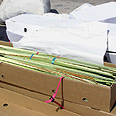
Lulavs packed and ready to be sold - and used on Shabbat
This Sukkot, Jews who are fortunate enough to live in the Land of Israel have a unique opportunity to perform a special mitzvah: to take the lulav on Shabbat. As it says in the Mishna (Sukka 4a):
- The lulav and the arava - willow - (are taken) six or seven (days)… When is the lulav (taken) seven (days)? When the first day of Sukkot falls on Shabbat, one waves the lulav seven days; on other days, six.
So, why is this mitzvah special? First, it is not every year that the first day of Sukkot falls on Shabbat. On most years, the first day of Sukkot does not fall on Shabbat and the lulav is considered “muktzeh” on Shabbat. Muktzeh is a category of items not to be handled on Shabbat, though doing so is not a direct violation of Sabbath laws not to do work as per the Bible, but instead are rabbinically mandated.
Second, this mitzvah can only be performed in the Land of Israel. The Talmud (Sukka 43a) explains that the Jews of Babylon--who were in doubt as to whether the first day of Sukkot occurred on Shabbat or Sunday--did not perform the mitzvah of waving the lulav.
So how did we lose this mitzvah?
As the discussion of the lulav continues in the Talmud, it suddenly changes its position and surprisingly declares:"Since we in Babylon do not override Shabbat, they in the Land of Israel do not also. But what of the first day when we in Bavel do not override the Shabbat and they in the Land of Israel do? They answered: Lulav will not override Shabbat for them either!" (43b)
A stunningly new claim has been made that contradicts the previous conclusion: Since the Jews of Babylon do not override Shabbat by performing the mitzvah of waving the lulav, the Jews of the Land of Israel shouldn’t either.
A familiar-sounding rivalry
Not so dissimilar from the rivalry we unfortunately see today between the haredim and the national religious, our Sages wrote of an atmosphere of competition and rivalry that prevailed between the Jewish centers in Babylon and the Land of Israel. Regarding the mitzvah of lulav on Shabbat, it clearly seems that the sages of Babylon were ill at ease with the fact that the Jews of the Land of Israel were fulfilling a Torah-mandated mitzvah that the Jews of Babylon were not—and could not—perform as this could imply that the Jews of the Land of Israel were of a higher status and order.During the periods of the Tannaim (70-200 CE) and the Amora’im (200 to 500 CE) until at least the time of Abbaye (d. 337 CE), the Jews of Babylon had no choice but to recognize the lofty status and the birthright of the Jews and Sages of Land of Israel. During this period, it was acceptable for the Jews of the Land of Israel to perform the mitzvah of waving the lulav when the first day of Sukkot fell on Shabbat even though they themselves did not.
But with the passage of time, and the persecutions of the Jewish community in Eretz Yisrael by the Romans and the Byzantines, and later the Arabs/Muslims, the community dwindled until the center of Jewish life shifted to Babylon and the Babylonia community could impose their Halachic worldview.
Taking lulav this Shabbat
Fortunately I have been blessed to have returned to the Land of Israel, where I follow the mitzvahs and customs of that once-dwindling Jewish community. I observe only one Passover seder, observe only one day of holiday for Sukkot, observe shmitta and more.This year I will add another mitzvah to that list: taking the lulav on Shabbat. Although I will take the lulav in my sukka, before I go to synagogue, I pray for the day when all of the people of Israel will be ready to fulfil the mitzvah of lulav on Shabbat as the Mishna (Sukkah 3a) states:
"When the first day of Sukkot falls on Shabbat all of the Jews bring their lulavs to synagogue (on Friday night because of the prohibition of carrying from one domain to another); and (the next day) everybody identifies his lulav and takes it."















